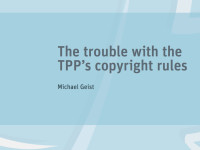For the past two months, the Canadian Centre for Policy Alternatives has been publishing an exceptionally important series on the problems with Trans Pacific Partnership. I was pleased to participate in this initiative and yesterday the CCPA posted my contribution. The Trouble with the TPP’s Copyright Rules draws on my earlier Trouble with the TPP series to highlight several of the copyright concerns associated with the agreement, including copyright term extension, the limited applicability of Canada’s notice-and-notice rules, and the expanded criminalization of copyright law.
Latest Posts
Canada’s National Digitization Plan Leaves Virtual Shelves Empty
Imagine going to your local library in search of Canadian books. You wander through the stacks but are surprised to find most shelves barren with the exception of books that are over a hundred years old. This sounds more like an abandoned library than one serving the needs of its patrons, yet it is roughly what a recently released Canadian National Heritage Digitization Strategy envisions.
Led by Library and Archives Canada and endorsed by Canadian Heritage Minister Mélanie Joly, the strategy acknowledges that digital technologies make it possible “for memory institutions to provide immediate access to their holdings to an almost limitless audience.”
Yet it stops strangely short of trying to do just that.
Pokémon Go Craze Brings New “Augmented Reality” Legal Issues Into Light
Unless you’ve been offline or focused on a distorted national anthem rendition for the past week, you know that Pokémon Go has taken the world by storm with millions of people wandering around searching for virtual Pokémon characters. The game was officially released in Canada on the weekend – it started first in the U.S., Australia, and New Zealand – with millions of people already playing it.
My weekly technology law column (Toronto Star version, homepage version) notes that Pokémon Go provides a first peek at the potential of widespread use of “augmented reality”, which combines real space places such as parks or buildings with virtual characters or objects that appear on a computer or smartphone. In this case, the app uses GPS on smartphones to identify players’ physical location with the goal of collecting and training virtual Pokémon characters located there.
Why the Canada – EU Trade Deal is in More Trouble Than the Government Admits
The Canadian government has characterized the proposed trade agreement between Canada and the European Union (CETA) is its top trade priority. The deal would increase trade by removing tariffs from many products, but also create significant costs. The implications for digital and intellectual property issues are particularly important, with chapters on e-commerce and telecommunications services, an extension of patent protections for pharmaceutical drugs could raise health care costs by millions of dollars, and protections for hundreds of geographical indications may restrict Canadian producers of common cheeses, wines, and meats.
My weekly technology law column (Toronto Star version, homepage version) notes that the substance of CETA merits debate, but its most distinguishing feature during the seven years of negotiations has been the steady stream of unrealistic claims from Canadian officials about how close they are to concluding the deal.











